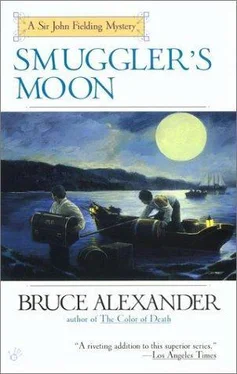Bruce Alexander - Smuggler's Moon
Здесь есть возможность читать онлайн «Bruce Alexander - Smuggler's Moon» весь текст электронной книги совершенно бесплатно (целиком полную версию без сокращений). В некоторых случаях можно слушать аудио, скачать через торрент в формате fb2 и присутствует краткое содержание. Жанр: Исторический детектив, на английском языке. Описание произведения, (предисловие) а так же отзывы посетителей доступны на портале библиотеки ЛибКат.
- Название:Smuggler's Moon
- Автор:
- Жанр:
- Год:неизвестен
- ISBN:нет данных
- Рейтинг книги:4 / 5. Голосов: 1
-
Избранное:Добавить в избранное
- Отзывы:
-
Ваша оценка:
- 80
- 1
- 2
- 3
- 4
- 5
Smuggler's Moon: краткое содержание, описание и аннотация
Предлагаем к чтению аннотацию, описание, краткое содержание или предисловие (зависит от того, что написал сам автор книги «Smuggler's Moon»). Если вы не нашли необходимую информацию о книге — напишите в комментариях, мы постараемся отыскать её.
Smuggler's Moon — читать онлайн бесплатно полную книгу (весь текст) целиком
Ниже представлен текст книги, разбитый по страницам. Система сохранения места последней прочитанной страницы, позволяет с удобством читать онлайн бесплатно книгу «Smuggler's Moon», без необходимости каждый раз заново искать на чём Вы остановились. Поставьте закладку, и сможете в любой момент перейти на страницу, на которой закончили чтение.
Интервал:
Закладка:
I found Mr. Perkins in the taproom of the inn, where ale and beer flowed freely. The bar was crowded with raw and boisterous men of every description who seemed to have little in common but their loud speech and their thirst for malt. They stood cheek-by-jowl, howling and shouting each at the other. I could scarce believe it was no more than midday and could not but wonder what the place might be like at midnight. No, he was not at the bar. I wandered round in search of him at one of the tables placed along the wall and found him at that which was farthest. All was as expected. What I had not foreseen, however, was that Mr. Perkins would be sitting in the company of another. I thought at first glance he might wish me to stay away; but no, he pointed me out to the man with whom he shared the table, and then waved me over.
I was not in a good position to see the face of the stranger until he turned to look at me. He was a man of about the same age as Mr. Perkins, tall and lean (somehow that was obvious, even though he maintained his sitting posture), with what appeared to be a saber scar across his left cheek. As I drew closer, I saw that he was smiling at me, though only with the right side of his mouth.
“Jeremy, meet an old friend of mine from bygone days, name of Dick Dickens.”
Dickens reached across the. table, offering his hand as I sat down. Mr. Perkins passed on to me a broad and most obvious wink. I gave a manly squeeze to the hand and a proper nod to the constable, signaling my understanding: I would follow his lead.
“What say you, Jeremy,” said the constable, ”have they kept you hopping to their tune?”
I shook my head in the negative. ”Nah, ‘tan’t so,” said I to him, effecting the manner of speech of a Covent Garden lay-about. ”It’s mostly just waitin’ for when we’re needed.”
“It was Jeremy got me the ride down here,” said he to Dickens.
“In a gentleman’s coach? That an’t half bad.”
“No, it was on a gentleman’s coach. You think you’d like to go bouncing about on your arse, just hangin’ on for dear life atop a coach with four horses at full gallop-you think that, then you’re welcome to my space back to London.”
“No, but I thank you all the same,” said Dickens with a chuckle.
At last did I remember whence I knew that name, Dickens. It was Dick Dickens who figured so prominent in Mr. Perkins’s tale of his life in the owling trade. He had enlisted him all those years ago. By luck or by cleverness, Constable Perkins had made direct contact with the smugglers.
“Which gentleman is it has the coach?” asked Dickens.
The question seemed to be directed at me, yet I was unsure how I should answer. Thus was I relieved when Mr. Perkins came forth with the information-false information as it happened.
”It belongs to John Fielding, a knight by the pleasure of King George.”
“Sir John Fielding, is it?” said Dickens. ”An’t he the blind magistrate there in Covent Garden?”
“That’s the one.”
“You work for him? Don’t tell me you’re a constable!”
“Do I look like a constable?” said Mr. Perkins. ”You ever see one with just one arm?”
“No, I don’t guess I ever did.”
“I’m his dogsbody.”
“What’s that?”
“I do whatever I’m told to. Fetch what needs to be fetched, carry messages back and forth, just an errand boy, really.”
“And what about you, lad? What do you do for the blind magistrate of Bow Street?”
“Just a footman,” said I.
“Ah well,” said Dickens. ”We all got to start somewhere, don’t we?” He then rose and said something that struck me as strange: ”I must get back to the castle.” He shook hands once again and bade us goodbye, leaving near a full half-pint of ale at his place at the table.
Once he was out of earshot, I turned to Constable Perkins and in a voice so quiet it may as well have been a whisper, I said to him, ”That was the Dick Dickens you told us about, wasn’t it? The one who got you into the smuggling trade?”
“That’s who it was, Jeremy, and I was quite amazed when he walked into this place not long before you came along. I recognized him right away-he’s not changed all that much-but he more than recognized me.”
That seemed odd. ”What do you mean?”
“Well, he came up to me right away, like he knew that I was here-and maybe he did.”
Again, he had done naught but confuse me.
”What do you suppose he’s up to now? Guess, Jeremy, just try.”
“Why, I’ve no idea, really,” said I. ”Still in smuggling, I suppose.”
“Oh no, not like that at all. But this is unfair. You’ll never guess.” He took a deep breath and uttered as softly as ever he could: ”He’s a customs man.”
I heard what he said, though I did not quite trust my ears. ”He’s what ?”
Perhaps I spoke too loudly-or perhaps it was Mr. Perkins’s obvious wish not to be overheard which attracted attention-but glancing about, I noticed that a number of faces at the tables near ours had turned in our direction. Mr. Perkins noticed, as well. He jumped to his feet.
“Come along,” said he. ”Let’s go to the bar. The crowd there is so loud, they’ll pay no attention to us.”
And thus it transpired that we concluded our conversation standing at the bar where he called for another ale, and I ordered coffee. We were two of that roaring crowd who roared along with the rest. Yet I daresay none of our near neighbors paid us the slightest heed. Mr. Perkins shouted his news to me loud as the town crier might have done in days gone by. None but me did hear him, though. Of that I’m sure.
As Mr. Perkins told it, he had been sitting at that most distant table, sipping an ale and awaiting my arrival when Dickens came into sight and walked straight over to him. Recognition was immediate. They greeted each the other like long-separated friends and immediately fell to talking about all that had happened during the years that had passed since last they met. Dickens’s first concern was for Mr. Perkins’s missing left forearm. He asked the usual questions: How had it been lost? Did it pain him? Was he able to do without it? Et cetera. These and other such questions Mr. Perkins answered quickly and directly, for he had prepared an elaborate story which concerned a wound given him in the battle for Fort Duquesne.
“I took a proper chop at the elbow from a tomahawk,” he had told Dickens. ”That, for your information, is a sort of Injun hatchet.”
Dickens, properly impressed, had winced visibly. Yet he was in no wise helpful when Mr. Perkins hinted that he had returned to Deal hoping to find employment. Did he know of anything in that trade in which they had both once worked?
“Ah well,” Dickens had responded. ”Afraid I can’t help you there. I’ve moved across to the other side of the street now.”
When asked to explain that, he said that he was now with the Customs Service.
“I must have looked at him pretty queer,” said Mr. Perkins to me, ”for he laughed a bit and swore it was all true. Not only that, but then he tells me that he’s the customs officer for Deal with an office in Deal Castle and twenty men to do his bidding. I wanted to hear more, of course, but it was just about then that you came by, Jeremy.”
I thought about what had then been said by and to Dick Dickens, and I realized that there was something that had puzzled me.
“I’ve a question, Mr. Perkins.”
“Ask it then, and I’ll answer if I can.”
“Why did you mention Sir John to him at all? You needn’t have done. A complete fiction would have worked just as well.”
“True enough, I suppose,” said he. ”But if you had seen the way that Dickens came up to me at that table, you’d understand. I happened to be looking in his direction when he come round the corner, and he wasn’t looking left or right at all. He knew right where I’d be, and he knew exactly who I was. No, I figure that he’d been told about me- somebody must’ve recognized me from the old days and told him where I’d be. As for why I then brought Sir John into it, it seemed to me that if I was being watched that close, they might just possibly see me around Deal sometime soon with Sir John-or at least with a blind man who answers his description. And if they did, I wanted to account for it in advance.” He paused. ”Why? Didn’t you think much of the story I gave?”
Читать дальшеИнтервал:
Закладка:
Похожие книги на «Smuggler's Moon»
Представляем Вашему вниманию похожие книги на «Smuggler's Moon» списком для выбора. Мы отобрали схожую по названию и смыслу литературу в надежде предоставить читателям больше вариантов отыскать новые, интересные, ещё непрочитанные произведения.
Обсуждение, отзывы о книге «Smuggler's Moon» и просто собственные мнения читателей. Оставьте ваши комментарии, напишите, что Вы думаете о произведении, его смысле или главных героях. Укажите что конкретно понравилось, а что нет, и почему Вы так считаете.












